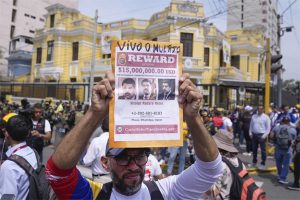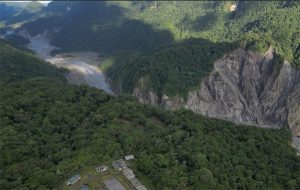
Mexican President Andrés Manuel López Obrador said he would not attend next month’s Summit of the Americas in Los Angeles if the Biden administration excludes Cuba, Venezuela and Nicaragua. Mexico’s leader said he wants all the countries in the region to be invited. It is unclear whether the US will invite Cuba, Nicaragua and Venezuela. (Reuters, see April 26’s post)
He is the latest leader to voice concern over the invite list, after Caribbean Community (Caricom) leaders discussed a collective boycott of the summit if nations are excluded and criticized the U.S. plan to invite Venezuelan opposition leader Juan Guaidó. Today Bolivia’s President Luis Arce joined AMLO’s stance. Argentina, which currently holds the rotating presidency of the Community of Latin American and Caribbean States, also issued an appeal this month to avoid excluding any governments. (Associated Press, Associated Press, and Friday’s briefs)
Separately, Brazilian President Jair Bolsonaro has told his aides he won’t be going, but gave no reason why, reports Reuters.
Despite the voices of protest, most leaders who are invited will likely attend, predicts James Bosworth at the Latin America Risk Report. “The expected controversy is that there is a fight over who is invited, who is not invited and who may or may not attend. This happens at essentially every regional meeting.”
More Summit
- Lack of excitement about the meeting in general is perhaps “testimony to a hemisphere exhausted by the pandemic, record migration, political polarization and the worsening effects of climate change,” according to Americas Quarterly, which dedicated its latest issue to opportunities for cooperation that could bolster the meeting’s agenda.
- A renewed commitment to democracy could also help stop the erosion of freedoms and institutions being seen in many countries, writes AS/COA’s Eric Farnsworth.
- John Otis writes about how some Honduran farmers are adapting to climate change instead of migrating. But funding is scarce for strategies that include crop rotation, diversification, and other adjustments.
- And in Haiti, the international community should reconfigure its approach to aid, and target micro-loans to small-scale farmers, argues Michèle Duvivier Pierre-Louis.
- The U.S. Biden administration is working on a proposal to bolster economies in Latin America and strengthen ties with the region ahead of the summit meeting, reports Bloomberg. The framework would seek to set a new course for economic integration with the region and create an environment of stability to help attract private investment in countries where a lack of development and opportunities have spurred outward migration.
———————————————————————
Bolsonaro’s fight against the Brazil’s electoral system
In their influential 2018 book “How Democracies Die” Levitsky and Ziblatt argued that rather than staging an open coup, modern leaders may subvert the democratic process by repeatedly undermining institutions. In the runup to the October election, President Jair Bolsonaro appears to be following their script closely, reports the Brazil Research Initiative.
Since 2018 Bolsonaro and his supporters have stoking baseless rumors about the integrity of the voting process, and particularly focused on sabotaging the reputation of Brazil’s well-regarded electronic voting system. The president alone is accused of making more than 5,000 false or distorted statements to date, including repeated attacks against the country’s electoral court and the Supreme Court. (Foreign Policy)
Bolsonaro’s questioning of Brazil’s electronic voting system and clashes with the judiciary have cost him the votes of Brazilian moderates and stalled recent gains, according to a Genial/Quaest poll released today. In fact, Bolsonaro’s persistent allegations against the country’s long-established electronic voting system have not lessened voter faith in it: distrust of electronic voting machines among Brazilians has fallen, to 22% of the electorate from 27% in September. (Reuters)
Another Bolsonaro move that drove away moderate voters was granting a pardon to his ally Congressman Daniel Silveira hours after the Supreme Court sentenced him to jail for threats against the judiciary and Brazil’s democratic system. The poll showed 45% of voters disagreed with the pardon while 30% approved of it. (Reuters)
More Brazil
- Brazilian presidential candidate Luiz Inácio Lula da Silva remains firmly in the lead for October’s election, with 40.6 percent of voter intentions against 32 percent for Bolsonaro according to a new opinion poll by CNT/MDA released yesterday. But Bolsonaro gained ground in recent polls. (Reuters)
News Briefs
Regional Relations
- U.S. government officials in March asked Brazil’s state-run oil company Petrobras whether it could increase crude output after Russia’s invasion of Ukraine sent global prices soaring, but were told that output levels respond to business strategy rather than diplomacy, reports Reuters. Petrobras officials reportedly also said that a significant short-term production boost would not be logistically possible.
- Former U.S. Secretary of Defense Mark Esper said he prevented “dangerous things” from happening during the time President Donald Trump was in office, including military intervention in Venezuela and a blockade of Cuba. “At various times, certainly during the last year of the administration, folks in the White House were proposing to take military action against Venezuela,” Esper said in an interview on CBS’ 60 Minutes. At some point, he said, “somebody proposed we blockade Cuba.” (Miami Herald)
Honduras
- Former Honduran President Juan Orlando Hernández pleaded not guilty to drug charges in a U.S. federal court yesterday. Prosecutors allege he was part of an international trafficking network that moved 500 tons of cocaine over two decades. (InSight Crime, see yesterday’s briefs)”
- Also yesterday, former Honduras National Police Chief Juan Carlos Bonilla Valladares, better known as “El Tigre,” was extradited to the U.S. to face drug
charges in the same New York court. The two cases “offer a stark display of how drug money infiltrated the highest rungs of government and law enforcement in Honduras,” according to InSight Crime. (See yesterday’s briefs.)
Haiti
- U.S. authorities charged a leader of a violent Haitian gang with conspiracy to commit hostage-taking for his alleged role in the brazen kidnapping of 16 American missionaries with an Ohio-based charity in the Haitian capital last year. (Washington Post)
Mexico
- Eleven journalists have been killed in Mexico so far this year, a significant increase in violence even in a country that has long been one of the most dangerous in the world for media workers. There is no single cause, reports the Washington Post. “Instead, the deaths point to the wide range of threats that journalists here face daily — and the impunity that allows their killers to act without fear of consequence.”
Ecuador
- Imprisonment is nearly “a death sentence” in Ecuador, warned Amnesty International yesterday, after 44 prison inmates were killed in a jail massacre on Monday. (Al Jazeera, see yesterday’s post.)
El Salvador
- A woman in El Salvador has been sentenced to 30 years in prison for the death of her unborn child following an obstetric emergency. El Salvador is known for its draconian prohibitions against abortion, which have resulted in decades-long sentences for women who suffered obstetric complications, but this case is the first of its kind in the past seven years in the country, reports Al Jazeera.
Colombia
- Colombia’s highest court legalized abortion in February, the latest in a regional string of reproductive rights victories. But the court’s narrow 5-4 decision legalizing abortion has also provoked backlash, illustrating some of the green wave’s challenges, reports NPR.
Argentina
- Argentine President Alberto Fernández responded to criticisms from Vice President Cristina Fernández de Kirchner, who said last week that the government has “disappointed” its voters. Her view is partial and doesn’t take into account pandemic difficulties, Fernández told El País in an interview, in which he welcomed debate but demanded mutual respect.
A group of Argentine ruling party lawmakers presented a bill to create a “universal basic salary,” which would apply for unemployed people and low-income workers. The proposal has the backing of the social development ministry, but not the economic ministry, highlighting the government’s internal rifts, reports Bae Negocios. - Fernández said yesterday that he will seek reelection during the 2023 presidential elections. (Reuters)
- Fernández and the first lady, Fabiola Yánez, offered to pay three million pesos in damages for a birthday party held in the official residence while Argentina was in strict Covid-19 lockdown in 2020. (La Nación)
Paraguay
- Paraguay’s prosecutor of organized crime and drug trafficking cases was slain Tuesday by gunmen on a Colombian beach. (Associated Press)
Peru
- Peru will increase public spending in mining regions in a bid to de-escalate social conflicts that have impacted mining output, announced the country’s finance minister yesterday. (Reuters)
Latin America Daily Briefing —
http://latinamericadailybriefing.blogspot.com
—











